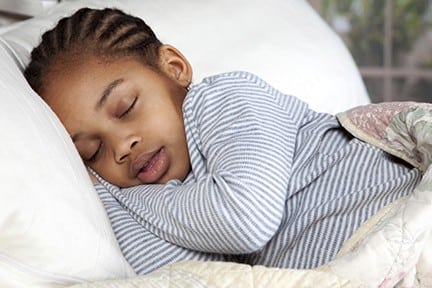Whether you have a newborn, a toddler or a 10 year old, a good night’s rest is extremely important for all children. Most parents know that getting a child to go to bed is usually easier said than done, though. When it comes to convincing an active toddler that it’s time to rest, it’s not unusual to meet resistance at the suggestion that it’s nap or bedtime. Even for parents of older kids, getting through the bedtime routine can be a source of daily frustration.
Sleep is important to all of us, children and adults alike. For adults, it helps regenerate the body and the mind, plays a part in our metabolism, immune function and memory. But for kids who are constantly growing, it’s the downtime needed to support their developing bodies.
“Sleep is so important in a child’s development, which is why it’s vital that they get the recommended amount of sleep according to their age,” said Erick Viorritto, MD, pediatric neurologist and sleep medicine specialist with the Children’s Sleep Disorders Center associated with Nemours Children’s Specialty Care, Jacksonville, and Wolfson Children’s Hospital. “The brain releases the growth hormone from the pituitary gland during sleep, and that stimulates the muscles, bones and other complex systems in the body to strengthen and develop.”
Newborns sleep about 18 hours a day and by the time they are three months old, it drops to about 14 hours. Getting a newborn on a schedule where they are sleeping longer stretches at night can take about six to eight weeks, but most won’t sleep the majority of the night until they reach about four to six months old. At this point, sleep is divided into several parts of the day for children this age due to their sleep cycles, which are much shorter. Children one to two years old require about 12 to 14 hours. Before 18 months, many will continue to take two naps, but around that time, it’s common for the morning nap to go away. By age six, the need for sleep drops to about 11 hours and by age 10, 10 hours.
The challenge with naptime is that it’s light outside and there’s generally more activity going on in the house (phone ringing, television on, other siblings playing), and toddlers don’t like to miss out on the fun! Your best bet is to keep the room dimly lit by closing curtains, and try to reduce as much noise as possible. For weary parents, it’s sometimes hard to decide who needs a break most! Toddlers go through an intense period of physical and developmental changes and process what they’ve learned while they are sleeping, so getting proper rest regenerates their minds and bodies.
“Toddlers thrive on routine, so getting into one when planning your child’s day provides security and actually eases transitions from active times of day to calm ones,” said Dr. Viorritto.
Providing a favorite toy, giving them a warm bath and reading a bedtime story are all great ways to make bedtime more appealing and to help them wind down. Establishing a good routine at bedtime is generally the best way to get older children some pillow time, too. And for kids of all ages, avoiding television, video games, tablets like iPads and other electronic devices before bedtime are good ways to encourage your little ones to relax and prepare physically and mentally for going to sleep.
If you’re finding that doesn’t work and you’ve followed all the rules set forth by your child’s pediatrician for establishing bedtime rituals, Dr. Viorritto suggests that it might be time for an evaluation by a sleep medicine specialist. Problems with sleep can occur at any age, and it can have a huge impact on the entire family.
“About 20 percent of all children suffer from some form of sleeping problem,” said Dr. Viorritto. “The causes range from poor sleep habits and behavioral problems to underlying medical conditions.”
Assessment can involve keeping a sleep log or diary of your child’s sleep habits over a two-week period, overnight sleep studies or sleep tests and education and support for parents to help manage a child’s sleep problems. Most of the time, finding the right antidote is just a matter of establishing a good routine and sticking to it.
The Wolfson Children’s Hospital Sleep Disorders Center provides comprehensive services through our physician partnership with Nemours Children’s Specialty Care, Jacksonville, to evaluate, diagnose and treat infants, children and adolescents with sleep problems. The team assists pulmonologists who are sleep medicine specialists, who work with pediatricians and primary care physicians to help children with problems including sleep-disordered breathing, insomnia, sleep schedule problems, excessive daytime sleepiness, bed wetting and night terrors.
For more information about how much sleep kids need and more information about the Sleep Disorders Center at Wolfson Children’s Hospital, visit wolfsonchildrens.org.
Thank you Wolfson Children’s Hospital for sponsoring this post.


















